By Victor Chernozhukov, Professor, Department of Economics and Center for Statistics, MIT, Hiro Kasahara, Professor, Vancouver School of Economics, University of British Columbia, and Paul Schrimpf, Associate Professor, Vancouver School of Economics, University of British Columbia. Originally published at VoxEU.
Faced with COVID-19, people rationally and voluntarily respond to information on risks, making it difficult to distinguish the effect of containment policies from that of voluntary behavioural responses. This column examines the effect of mandatory mask policies on COVID-19 cases and deaths in the US. If the US had on 1 April 2020 universally mandated that employees of public-facing businesses use masks, there could have been nearly 40% fewer deaths by the start of June. Containment policies had a large impact on the number of COVID-19 cases and deaths, directly by reducing transmission rates and indirectly by constraining people’s behaviour, and account for roughly half the observed change in the growth rates of cases and deaths.
The COVID-19 pandemic has sparked an explosion of research evaluating various policies using observational data (e.g. Courtemanche et al. 2020, Deb et al. 2020, Hsiang et al. 2020, Pei et al. 2020, and Abouk and Heydari 2020), but there is no consensus on what would have happened to cases and deaths if these policy measures had not been implemented.
The evaluation of counterfactual policy effects on the spread of COVID-19 is complicated. People rationally and voluntarily respond to information on transmission risks even without any policies. This makes it difficult to distinguish the effect of polices from that of voluntary behavioural responses.
To properly evaluate the role of policies relative to people’s voluntary responses, we develop an empirical framework based on the following causal path diagram (Chernozhukov et al. 2020). There are five key components: (1) confounders, such as socio-demographic characteristics, (2) information about current infection levels and growth rates, (3) policies reacting to the information, and (4) local behaviour of people reacting to the information and effective polices, all of which together determine (5) final outcomes, such as case and death growth rates. The system is dynamic: the health outcomes today become information for the next period.
Figure 1 Causal path diagram
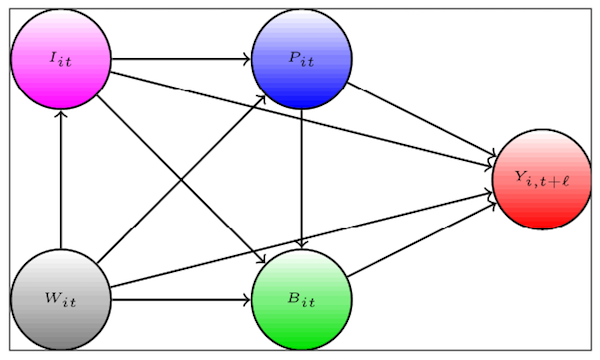
Notes: W denotes confounders, I information, P policy, B behaviour, all realised in that sequence by the time t in state i; Y denotes outcomes realised at future date t+l.
This causal framework explicitly recognises that policies not only directly affect the spread of COVID-19 (via masks) but also indirectly – by changing people’s behaviour (through restaurant closures, school closures, stay-at-home orders). It also recognises that people react to new information, such as new cases and deaths in their state, and voluntarily adjust their behaviour (social distancing, hand washing, masks) even without any policy in place.
The framework, coupled with parametric structural equations, can quantitatively decompose the growth of COVID-19 cases and deaths into three components: direct policy effect, policy effect through behaviour, and direct behaviour effect in response to new information.1
Many of the existing papers analyse different parts of the causal diagram. In our paper we take a more holistic approach and analyse the entire causal dynamic model, analysing both the direct and indirect effects of policies on infections and on behaviour as captured by Google Mobility Reports. Using US state-level data, we examine how a mask mandate and other lockdown policies have affected the growth rates of cases and deaths by conducting counterfactual experiments within the model.
Mask mandates for employees directly reduced transmissions
Figure 2 illustrates the raw-data fact: the US states with mask mandates for employees of publicly facing businesses tend to have lower case and death growth rates than states without mask mandates since the end of April 2020.
Our causal analysis, which controls for many confounding factors and dynamics, confirms this raw-data finding. The effect is mostly direct (without affecting people’s behaviour), suggesting that wearing masks lowers transmission risk per contact.
Figure 2 Evidence from raw US data: The average growth rates in cases and deaths for states without mask mandates (red) and with mask mandates (blue)

Figure 3 shows the result of our counterfactual analysis based on the estimated causal dynamic model. Nationally implementing mandatory face masks for employees on 1 April could have reduced the weekly growth rate in cases by as much as 10%, which translates into a nearly 40% relative reduction in cumulative deaths (90% confidence interval of [17,55]%). This implies that as many as 17 to 55 thousand lives could have been saved through the beginning of June; as of 27 May 2020, the US Centers for Disease Control and Prevention reports 99,031 deaths in the US.
Figure 3 Relative decrease in deaths induced by nationally mandating masks for employees of publicly facing businesses on 1 April in the US
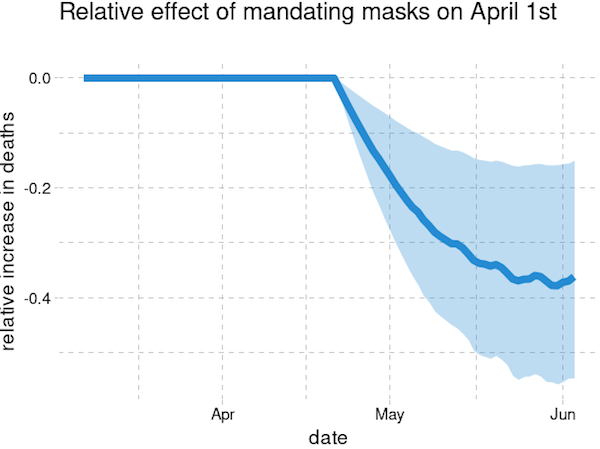
Our finding is corroborated by a different causal methodology based on synthetic control using German data in Mitze et al. (2020),2 which reported an absolute 20% reduction in the growth rates. Our finding is further consistent with the laboratory results in Hou et al. (2020), who show that the nasal cavity may be the principal initial site of infection, thus supporting “the widespread use of masks to prevent aerosol, large droplet, and/or mechanical exposure to the nasal passages”.3
Could we have kept non-essential business open?
In Figure 4, another counterfactual experiment indicates that keeping non-essential businesses open (other than movie theatres and gyms, and keeping restaurants ‘takeout-only’ mode) could have increased cumulative cases and deaths by 15% (with a 90% confidence interval of [-20, 60]%).
Figure 4 Effect of leaving non-essential businesses open on COVID-19 cases in the US
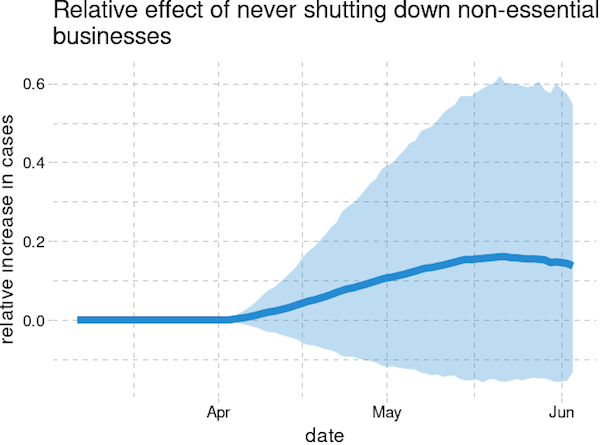
These findings are in line with other analyses that found that closing non-essential businesses hardly affected social-distancing behaviour (Maloney and Taskin 2020). This suggests that universal masks policies could have compensated for keeping substantial parts of the economy open.
Stay-at-home (or shelter-in-place) orders
Figure 5 shows that, without stay-at-home orders, there could have been an 80% increase in total cases by the start of June (90% confidence interval of [25,170]%). This implies that 0.5–3.4 million more Americans could have been infected without stay-at-home orders, providing suggestive evidence that reopening via removal of stay-at-home orders could lead to a substantial increase in cases and deaths.4
Figure 5 Effect of not implementing stay-at-home order on COVID-19 cases in the US
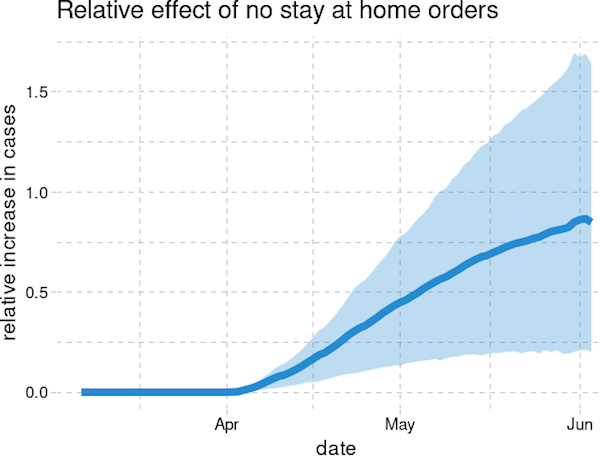
Policy or private behavioural response?
Hsiang et al. (2020) and Chernozhukov et al. (2020) find that the containment policies have substantially reduced the COVID-19 growth rates in the US, with policies roughly explaining one-third to two-thirds of the observed decline in growth rates of confirmed cases and deaths.
We further find that both policies and information on past cases and deaths determine people’s social-distancing behaviour, where policy effects explain about 50% of the observed decline in Google mobility variables and behaviour effects account for the other half.5 The estimates suggest that there are both large policy effects and large behavioural effects on the growth of cases and deaths. Except for mandatory masks, the containment policies affect cases and deaths indirectly through their impact on behaviour.
There are numerous strong claims in social media that containment policies did not matter and that the observed decline in COVID-19 growth rates and distancing behaviour is almost entirely due to private responses to information. We believe these claims are generated by misinterpretations of statistical analyses.
One reason for this, for example, is the difficulty of identifying school-closure effects. As shown in Figure 6 and 7 , the timing of school closures (Figure 7) predates or nearly coincides with a substantial drop in mobility as reported by Google reports (Figure 6).
Figure 6 Intensity of visits to ‘workplaces’
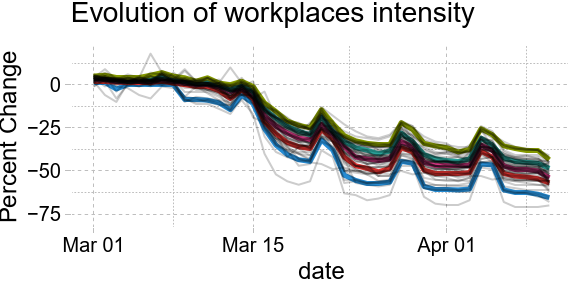
Notes: The figure shows the dynamics of the intensity of visits to ‘workplaces’ from Google Mobility Reports, which shows the sudden drop in the last two weeks of March.
Figure 7 School closures in the US
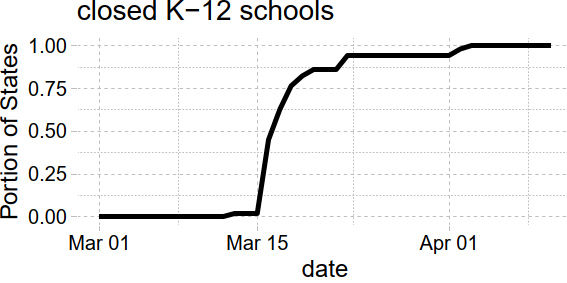
Notes: The figure shows the portion of states with closed schools, which slightly leads the mobility drop in Figure 6.
The increase in school closures also coincides with the large increase in total COVID-19 cases, an information variable. Lack of cross-sectional variation in school closures makes it difficult to distinguish the information effect on behaviour from the policy effect on behaviour. It is clear that school closures potentially affect behaviour by imposing very hard constraints on parents’ mobility, but the exact quantification of this policy effect requires richer data.6
Economic relevance
The economic evaluation of various policies is underway in many new papers (e.g. Chetty et al. 2020, Coibion et al. 2020). Understanding the effect of containment policies on fatalities and cases is crucial to understand the trade-off between health and economic wellbeing since fatalities entail direct economic losses but some COVID-19 survivors may suffer from long-term health complications (see e.g. Alvarez et al. 2020, Baqaee et al. 2020, Fernández-Villaverde and Jones 2020, Acemoglu et al. 2020, Keppo et al. 2020, McAdams 2020).
While the economic effect of some containment policies is hard to evaluate immediately, the effect of mask policies is clear and could be gauged from a simple calculation: 40,000 saved lives, in April and May, times the statistical value of life, e.g. $5 million, translates to a $200 billion economic impact – an order of magnitude bigger than the cost of implementing the universal mask policy.


Finally. Tucson is having a mask giveaway for those who need them. Link:
https://www.tucsonaz.gov/home/announcement/citywide-maskuptucson-free-mask-distribution-event-weekend
I already have masks, so I won’t be going. But [family blog] it, this sort of effort should have happened months ago. And at the national level.
I mean, for [family blog’s] sake, a Stars and Stripes reusable mask, made in the USA, could have been THE fashion statement of the decade! It could have saved lives too!
MAGA masks. Even Trump would have to wear.
This morning’s Walmart story in Links said they will–come July 20–give you a mask if you don’t have one. They also sell disposable masks.
Those disposable masks used to cost about .15 apiece and there’s no reason why some American company couldn’t be turning them out by the billions by now. Clearly medical supply companies looked at the proft margins and said “no way.”
China to the rescue !
https://thehill.com/homenews/state-watch/507600-georgia-governor-overrides-all-local-mask-orders-in-the-state
It could be the water, the plastic in the water, or maybe some radiation in the water.
It could be attending an Academy for primary and secondary education.
Or maybe spite….
Or maybe cover for DeSatan and McMushmouth
We got a special kind of crazy going on down here.
Although Kemp has encouraged voluntary mask-wearing, his order made it clear that cities and counties could not coerce people into donning a face covering. The move voids orders adopted by at least 15 local governments across the state, including the city of Savannah, local media reported.
– – – –
There are also questions about the legality of mask mandates. Kemp’s order coincided with a legal opinion issued by Louisiana Attorney General Jeff Landry, who argued that his state’s mask requirement was unlawful.
RT has the only article I found so far that mentioned possible legal problems with a mask mandates in some states.
Russia Today: Georgia governor bans mask mandates. ‘Ignore the science and survive the best you can,’ Savannah mayor complains
There are also questions about the legality of mask mandates. Kemp’s order coincided with a legal opinion issued by Louisiana Attorney General Jeff Landry, who argued that his state’s mask requirement was unlawful.
It is a argument, not a judgement.
The counter argument could be that Face Covers prevent the infected assaulting others, on the grounds that many face mask prevent transmission to people other than the mask wearer. One persona’s discomfort is not worth the death of another person.
States have different laws/constitutions but it’s arguable whether these are legal arguments or politics.
GA: governor (R) suing mayor (D)
IL: state rep (R) suing governor (D)
KY: AG (R) motion to stop governor (D)
LA: AG and state legislators dispute governor’s (D) orders
Federal: WH press sec today: “President Trump [*] does not want to issue a nationwide mask mandate to combat the coronavirus and instead wants local governments to make their own choices,
[*] who has claimed that Article II allows him to do anything he wants
https://www.washingtontimes.com/news/2020/jul/16/brian-kemp-sues-atlanta-over-mask-mandate/
https://chicago.suntimes.com/coronavirus/2020/4/29/21241189/republican-lawmaker-launches-new-legal-attack-illinois-governor-jb-pritzker-stay-at-home-order
https://www.msn.com/en-us/news/politics/attorney-general-asks-state-judge-to-block-all-of-beshears-covid-19-orders/ar-BB16PP8m
https://news.yahoo.com/white-house-says-trump-wont-issue-a-nationwide-order-on-masks-200012165.html
So much time and energy fighting in court over masks, a public health measure that’s not new or difficult.
How would you enforce wearing masks? Businesses can use the No Shoes No Shirt No Service justification but outside what should be done by government? Put up facial recognition cameras all over the place and fine people by mail like has been done with speeding tickets and red light cameras? DUI style checkpoints for mask wearing?
Being in a Thai/Hmong community I don’t mind the practice of shunning people that don’t wear masks when near other people. Someone who doesn’t wear a mask near other people is avoided like they are diseased.
And, now Kemp is suing the Atlanta mayor to revoke her order.
https://www.ajc.com/politics/politics-blog/kemps-office-files-lawsuit-seeking-to-block-atlanta-mask-mandate/JJQ5DQW2QFE6PN7TTVO2ISNFDQ/
It’s getting more and more surreal here.
And Feinstein, apparently forgetting she’s supposed to pretend to be marginally less evil, is suggesting withholding pandemic relief to the people in states without a mask mandate.
https://thehill.com/homenews/senate/507760-feinstein-proposes-withholding-covid-19-relief-from-states-without-mask
Rut-roh
Bottoms, a potential running-mate for presumptive Democratic presidential nominee Joe Biden, announced the “phase one” guidelines after a week of escalating tension with Kemp.
About masks. I have two patents for filtration, one water, one air.
The Bill Nye vid shows him blowing out a candle through a heavy knit scarf then not blowing out a candle with double layer fabric mask. This is useless test. FIltration is not supposed to stop or severely inhibit flow, quite the opposite. Filtration is designed to not slow the flow of air or if it does then the force of air flow must be increased. which is not practical for general human use. Virtually all masks leak around the edges except for respirators and masks that are high flow and are well fitted but even these can leak if your face is distorted enough. The more you inhibit air flow the more they leak. An extreme example would be taking a mask with very low flow because of heavy, tight weave fabric, or double fabric that is wet. When you exhale the mask will literally be lifted off your face so the air can get out…unfiltered by the way. The longer you wear a mask the less flow because of moisture and particulate matter build up.
Taking a double layer cloth mask and cutting out the inner layer leaving a half inch or so of fabric before the sew line then pulling out on the weave and weft as you go all the way around fraying the fabric as much as you can. This will allow the air you exhale to pass through the filter and any that tries to go around the sides will be filtered by the fray.
I am willing to bet the heavy knit scarf is a more functional filter than the double layer cloth mask especially if you felt it up a bit. Get it wet then work it into a tighter shape or put it in the drier for a bit (not recommended for you fav scarf that grandma knit).
High flow masks will be worn more often and for longer significantly reducing particulates in the air. Non-woven media of 1/8 to 1/4 thick is best.
Thanks—your comment is nicely clarifying. You’re supposed to be able to breathe through the damn thing after all.
Breathe? Yes!. But not spit or other droplets.
I have absolutely no problem with masking up when and where the occasion dictates. What I fear, is what edicts from the ‘Perts on High’ come down the road, purportedly for our ‘safety’s sake .. and ‘benefit’ .. such as the hinky and hastily con sidered Cares Act, which provided awesome Waves of Bank .. for WallStreet/Corpserates … at great loss to keeping the 80%ers affected by authoritarian dictates above the Churning deepwaters of Fin!
Just wait for those ‘mandatory’ vaccine injections orders to be blared across the Realm .. to be ‘had’ by all those ‘dutiful’ ‘zens ..
The Cloud People – Yes, even including those on fauxbending knee donning Kente cloth .. will troll the mopes .. till the mopes can’t tread no more!
What concerns me as well is the shaming of young people. Young people are barely a vector and are certainly not affected by this disease anywhere near the rate of the elderly or immunosuppressed. There are reports of young people getting blood clots, yes, but your risk of heart attack and stroke goes up with influenza, too. Given that the young are more likely to be crushed economically by lockdowns, it seems to me that the message should be simple: if you are elderly or have an underlying issue, socially distance.
Instead, everyone is treated the exact same as we reopen the economy for all. It doesn’t make a lot of sense. Not all cases are the same, not even close.
Provisions can be made for those who need to be protected. Hell, give them money to stay home.
Instead, the narrative has shifted to “irresponsible youth”.
“Instead, everyone is treated the exact same as we reopen the economy for all. It doesn’t make a lot of sense. Not all cases are the same, not even close.”
The proponents of these draconian measures which are very similar to the 9/11, Patriot Act, Iraq Illegal War Runup in terms of attacking civil rights fail to explain why measures are not directed at the most vulnerable. It’s one-size-fits-all which is, forgive me, an absolutely unscientific and stupid policy. It reminds me of the whole Recycling Craze where each and every person on the Planet is responsible for recycling all the garbage, etc. instead of going after the Corporations who sell all the garbage and packaging. Go to the source of the problem, please.
I live in a rural area where there is no Covid yet all must adhere to many of these ridiculous and stupid universal rules. It makes us all sheep and subject to legal penalties. This is what governments (and their corporate controllers) want: a compliant and fearful population. Mission (finally) Accomplished.
(Does anyone remember that some commentators predicted that the psysops used in Iraq and other places would come home to roost in America? Well, I do.TIA and more is here.)
> I live in a rural area where there is no Covid yet all must adhere to many of these ridiculous and stupid universal rules.
I’m sure the dreadful cluster in rural Georgia felt exactly the same way. And then somebody from Atlanta came to a funeral. They had the virus…
You’re familiar with the etymology of the word pandemic? It’s from the Greek pandēmos (pan ‘all’ + dēmos ‘people’). So, a universal problem demands a universal solution.
precisely. Please show me any solid evidence that we can precisely manage this the way these posters above think we can. It dont work that way. wearing a mask and avoiding large crowds seem like a might small price to pay to keep your folks alive
Yo, coco
I live alone. I do not have minions to do my bidding. I must go to the market for food, the post office the pharmacy.
If all these yahoos refuse to wear a piece of cloth covering their face, the chances of me getting Covid increase. I have multiple risk factors. Yes, I’m beefing up the supplements etc but there’s no excuse to be a dick about your ‘freedum’ to infect.
I’m sorry to hear that. But most grocery stores are doing deliveries these days. It ain’t perfect, but I think people who are at risk should defend themselves first, because we don’t live in a country that will throw young people in jail for not wearing a mask. And they won’t. Out of the non mask wearing populations I’ve seen, they’re predominantly teens and kids in their 20s
Wearing masks is such a simple thing we can do for each other. Kids don’t need to be arrested. Adults need to lead by example, not actively undermine the practice,
My grocery store is not into driving 15 miles for a delivery. Even if they were, I couldn’t afford it.
Yep. You’ve got an ax that you’re grinding all over us.
“young people are barely a vector”
The rest of your post pay or may not be true, but ‘young people not being a vector’ is a bald faced lie. More and more of the new infected are younger people now, with the average age being in the 40s, with plenty in 30s/late 20s. Most of the older people have figured out they have to stay home already, so more and more of the new infections are people in my age group who think they’re immune because of bad information like the kind you’re spreading. Are they less likely to die from Corona? Yes. But they’re not ‘less of a vector’. That doesn’t even make any sense. Children under 12 may or may not be less of a vector, but even then we aren’t entirely sure. People in their 20s are just as liable to catch it as any other adults, just less likely to die of it, and even then we aren’t entirely sure what the long term consequences of surviving Corona are.
Thank you. Here are some statistics
CDC 07/16/2020
18-29 – 20.1%
39-39 – 17%
https://www.cdc.gov/covid-data-tracker/#demographics
Illinois 07/15/2020
Ages 10-19 and 20-29 rising “to rates that haven’t been seen thus far in the pandemic.”
https://www.nbcchicago.com/news/coronavirus/coronavirus-cases-spike-among-residents-between-ages-of-10-and-19-in-illinois/2305743/ 3:34 on video
edit: 30-39
https://www.vox.com/2020/5/2/21241636/coronavirus-children-kids-spread-transmit-switzerland
Children do not pass on the virus the way adults pass on the virus, that’s what the data is saying.
Young adults aren’t “just less likely to die of it”, their chance of death is incredibly small.
We also don’t know the long term effects of brake dust (Alzheimers is the current theory), but that doesn’t mean we stop people from driving.
saying they dont pass on the virus the same way is NOT the same thing as saying ” young people are barely a vector”
pretty apparent you are grinding an axe here
Did you read the cited study? Kids are not predominantly problem and we need to stop treating them that way. Instead the media is making kids out to be deadly
If children are passing the virus in a different way, and at a lower rate, I fail to see how that matters much, unless we are dealing with the problem with a lot more elegance than we are. That children are doing 10% of the spread rather than their usual 50% means that schools and Day cares should ideally rank higher in the list of things that can be reopened, which is great. But you have to have it under control to be able to rationally dial it up in less harmful ways.
And if brake dust is what is causing Alzheimers we should absolutely ban it, are you crazy? We can use regenerative braking or make brake pads out of other stuff… How much do you think Alzheimers costs a year vs a marginal increase in brake pad cost…
‘Young people are barely a vector’
Yeah, about that. From today’s Water Cooler – “Israeli Data Show School Openings Were a Disaster That Wiped Out Lockdown Gains”
https://www.thedailybeast.com/israeli-data-show-school-openings-were-a-disaster-that-wiped-out-lockdown-gains
Nicely put re The Cloud People .
Remember : all those at the top are, or become, paranoid about the mob who are coming for them. Twas ever thus. It’s the separation . I’m important so I want to be separate, but now I’ve achieved separateness I don’t like it, but I can’t give it up. Want an example – Mark Zuckerberg – an ordinary prole, nothing to separate him from the average programmer in Facebook. His clothes could have come from Walmart , his haircut – was it cut by his wife ? A voice like a robot. But please, please notice me .
> Understanding the effect of containment policies on fatalities and cases is crucial to understand the trade-off between health and economic wellbeing since fatalities entail direct economic losses but some COVID-19 survivors may suffer from long-term health complications . . .
There is no tradeoff. As long as this virus runs wild, economic wellbeing is not going to happen.
It seems the deciders are leading us into short term gain for long term pain. The peasants are getting it though. Masks are a tool in the battle against this thing. So is keeping a distance and hand washing, as the post says. As time goes on these tactics combined form a strategy and as moar peasants take these defensive measures, I believe it can be eradicated.
Jawb one is do not get it.